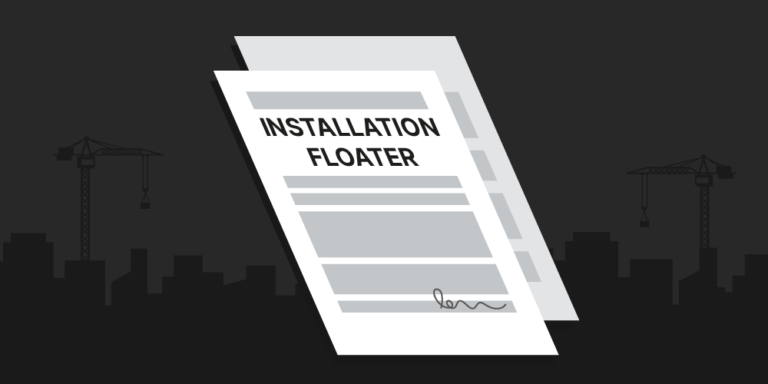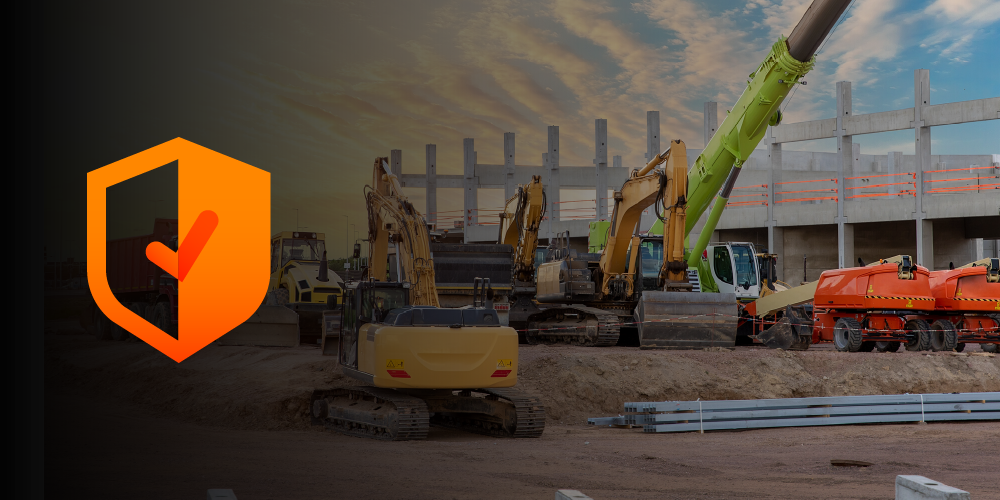— 5 min read
Installation Floaters for Contractors

Last Updated Aug 23, 2023

Thomas Tracy
Financial & Insurance Advisor
13 articles
Thom is a group benefits consultant with over 25 years of experience as an insurance and financial advisor. He has written for Quickbooks, tED Magazine, Investopedia, the National Bank of Arizona, and others.
Last Updated Aug 23, 2023

Despite your best efforts to protect building materials, any number of things can happen during the course of construction. Fire can destroy lumber and drywall, a severe storm can damage heating or cooling units, and custom-made cabinetry can mysteriously "walk away." You may already have an insurance policy that offers coverage for business property and general liability. But different rules apply for materials destined for installation and stored either on the building site or outside of it.
An installation floater can help keep the threat of loss at bay by offering additional protection for these materials.
Table of contents
What is an installation floater?
An installation floater is a form of insurance coverage that protects the value of building materials that will become a permanent part of a commercial or residential structure. The floater can stand alone or be a limited part of a builder’s risk business policy. This coverage typically begins when you take possession of, and transport, roofing shingles, windows, flooring, etc., and ends when those materials are installed as intended.
Some of the materials you purchase for a construction job can be run-of-the-mill items, but they can also be unique, high-value components that need to be protected from wind, fire, rain, or water damage, among other disasters. This coverage is derived from an installation floater that helps fill some gaps in a base-level contractor’s insurance package.
Installation floaters fall under the umbrella of inland marine insurance. This broader category of commercial insurance is designed to cover things like building materials, tools, or equipment, regardless of where these items travel.
Who needs installation floater insurance?
Any contractor or specialty contractor who purchases construction materials that eventually become part of a completed standing structure may want to consider installation floater insurance. When considering the amount loss that could occur from accidents, theft, natural disasters, etc. having an extra layer of protection is a safe bet.
Specialty contractors that could benefit from this coverage include:
- Electricians
- Carpenters
- Masons
- Landscapers
- Drywall installers
- HVAC specialists
- Painters
- Tile installers
The terms of a general contractor's construction contract may require that a specialty contractor be named as an additional insured on the contractor’s general liability policy. But, a specialty contractor may benefit only from a partial or total amount of liability coverage selected by the contractor.
Physical business assets such as tools and equipment are not protected under the GC’s policy. So, it's crucial to consider having separate property coverage from an installation floater to extend protection to building materials
What materials does an installation floater cover?
It’s important to differentiate between an installation floater and an equipment floater when designing your business insurance strategy. An installation floater provides coverage for building materials that will be installed on a job while an equipment floater protects the tools and equipment that you own.
To help clarify these differences, here’s a list of common materials covered by an installation floater:
- Concrete block
- Beams
- Lumber
- Plywood
- Sheathing
- Siding
- Brick
- Shingles
- Flooring
- Carpet
- Drywall
- Tile
- Paint
- Cabinetry
What’s not covered by an installation floater?
Tools and equipment you transport from job to job are not considered to be “installed” items. You might own or rent some of these items for your business, but it’s important to know that an installation floater does not cover the following:
- Hand tools
- Power tools
- Compressors
- Generators
- Concrete forms
- Ladders
- Planking
- Scaffolding
- Excavators
- Mobile storage units
How much does an installation floater cost?
Since an installation floater can be added to a contractor's policy by endorsement, or stand on its own, there will be additional costs associated with this coverage. The amount of those extra premium dollars will be determined by a number of factors. Here’s a quick peek at what variables affect cost:
- Value: The higher the blanket value you place on materials, the more the premium will be. All else being equal, coverage for $50,000 worth of materials will cost more than $25,000 worth of protection.
- Business category: Some subcontracting businesses are more prone to losses than others. An insurance company may charge more premium for businesses that incur more claims for stolen or lost materials than other entities.
- Coverage type: Some installation floaters may offer coverage on a named peril basis. This basis would typically include causes of loss such as fire, water, theft, and vandalism. Other policies give you the more expensive option of all-risk coverage, which covers all perils except those that are specifically named and excluded in the insuring agreement.
Installation floater vs. builders risk insurance
An installation floater may be secured through a comprehensive builder’s risk policy or purchased as a more customizable standalone solution, and it’s important to note the differences between the two when choosing a policy. An installation floater applies strictly to building materials while a builder’s risk policy includes additional coverages such as general liability and business property protection.
Primarily, you can include high-value materials on an individual installation floater policy, whereas a blanket endorsement attached to a builder’s risk policy might exclude unique items.
You may pay more in total premiums for a builder’s risk policy because it offers a broader range of coverage than an installation floater.
One step at a time
A solid insurance strategy for contractors and subcontractors means assessing coverages for each of your jobs. As your business evolves your insurance needs may do the same. Every project has its own distinct requirements so it's important to keep pace by keeping your insurance portfolio up to date.
Was this article helpful?
Thank you for your submission.
88%
13%
You voted that this article was . Was this a mistake? If so, change your vote
Scroll less, learn more about construction.
Subscribe to The Blueprint, Procore’s construction newsletter, to get content from industry experts delivered straight to your inbox.
By clicking this button, you agree to our Privacy Notice and Terms of Service.
Thank you!
You’re signed up to receive The Blueprint newsletter from Procore. You can unsubscribe at any time.
Categories:
Written by

Thomas Tracy
Financial & Insurance Advisor
13 articles
Thom is a group benefits consultant with over 25 years of experience as an insurance and financial advisor. He has written for Quickbooks, tED Magazine, Investopedia, the National Bank of Arizona, and others.
View profileExplore more helpful resources

What is Equipment Floater Insurance for Contractors?
Most contractors rely on tools and equipment to complete construction projects. But if something happens to those items, they can be expensive to replace. Contractors can benefit from purchasing an...

Construction Equipment Rental Insurance: How & Where to Get Coverage
Contractors and construction businesses that rent equipment should consider getting construction equipment rental insurance. This type of insurance covers the cost of replacing rented tools and equipment if they get...

Understanding Construction Insurance: Actuarial vs. Underwriting Factors
Determining the price of construction insurance is complex, with much of the work happening behind the scenes. Most construction companies interact primarily with an insurance broker or agent, but actuaries...

Construction Insurance Pricing: What Determines the Cost of Insurance?
Construction is a risky and litigious business, and insurance can help mitigate the risks for builders and owners. Construction insurance is a valuable and frequently required tool, so understanding how...
Free Tools
Calculators
Use our calculators to estimate the cost of construction materials for your next project.
Templates
Find a template to help you with your construction project tasks.
Material Price Tracker
Get the latest U.S. retail prices and view historical trends for common building materials.
Glossary
Explore key terms and phrases used in the industry.
